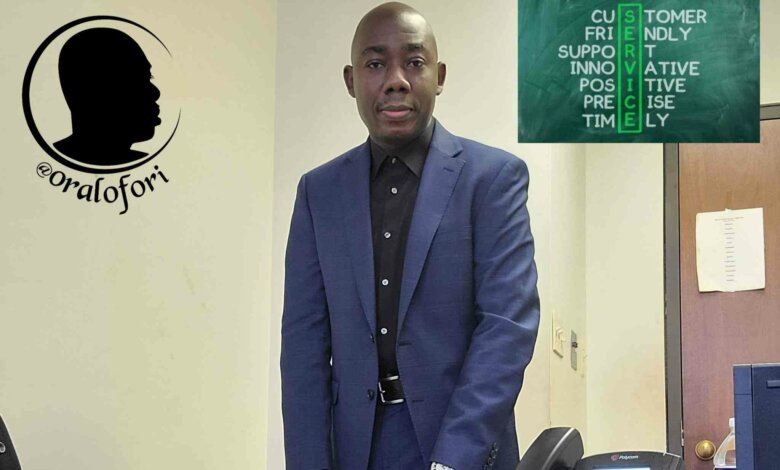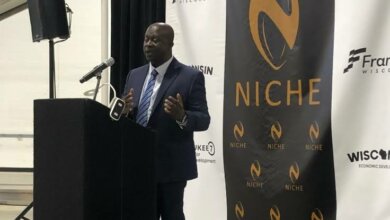
According to the World Expo 2020 held in Dubai, consumers across the globe considered customer service as equally, if not more important, than sheer product quality when making a purchasing decision.
I need not dilate here on the importance of excellent customer service in boosting sales in any company. Finances Online reported that 86 percent of buyers will pay more for a better customer experience, while 70 percent of buying experiences are based on how customers were treated.
However, businesses and institutions in Ghana are yet to realize the significant influence customer service has on their revenue generation and customer retention.
The Institute of Customer Service Professionals (ICSP) scored Ghana 62.6 percent in its Customer Service Index for 2019. The figure represented a 1.3 percent drop from the 63.9 percent recorded in 2018. The 62.61 percent score puts Ghana in grade C, denoting an average performance in the area of customer service relations.
However, the story was below average when Hector Wulff, AKA. Mr. Customer Service (a National Customer Service Advocate) and his team conducted a brief survey on the current state of customer service in Ghana at two major shopping malls in Ghana, namely the Accra Mall and the West Hill Mall; both located in Ghana’s capital city.
The team interviewed 25 citizens and 10 tourists. Out of the 25 citizens they interviewed, 18 were highly not satisfied with the state of customer service in Ghana but were of the view that customer service is not getting any better in Ghana, particularly within the Nation’s public sector. The remaining 7 citizens were of the view that customer service in Ghana, although not the best, has still significantly improved, particularly in Ghana’s private sector.
Read Also Ghanaian director Pascal Aka speaks on new movie ‘Gold Coast Lounge’
What do I say to the above? I feel attitudes need to change, we can do way better as Ghanaians both in Ghana and as guests living in other countries outside Ghana. As a people, Ghanaians are noted for being hospitable and champions of peace – imagine if the country decides to master its customer service capabilities!
Of the 10 tourists interviewed by the team, 7 vociferously registered their outright displeasure with the service experience in Ghana and vowed never to return to Ghana again when given a second opportunity.
One of the disappointed tourists retorted:
‘‘Ghanaians are very nice people, but customer service is badly unprofessional and inefficient everywhere I go in Ghana, Service providers turn to focus on personalities instead of service.”
When asked by host Dentaa Amoateng about her customer service experience in Ghana on the Odana Network TV Show, Ms. Rita Anyang Kusi, a lawyer and owner of AdinkraExpo, retorted in her American accent “does that exist?”
Mz Dru, the popular Ghanaian TV personality who had moved from the UK to Ghana three years ago, supported her co-panelist by exclaiming
“Exactly! If I had all the money in the world, I would have loved for somebody to have a customer service school where nobody would be allowed to work unless you have gone through that school and been certified”.
She ranted about her terrible experiences with Ghanaian restaurants and their delivery guys. Mz Dru was ably supported by her fellow co-panelist from the US, Nataki Kambon, an outspoken entrepreneur, media personality, and community activist passionate about creating social change through economics in Ghana. Nevertheless, Nataki recounted the one time she felt at home at a local shoe shop. She explained that if given the proper training, customer service in Ghana would improve.
I have had many horrible customer service experiences in Ghana but watching the three African diasporas lament their customer service experiences in Ghana, I felt a strong urge to add my voice to the urgent situation. I dare add that out of every 10 Ghanaian product or service providers, 9 do not employ professionalism in their transactions.
People in business are not intentional about their conduct towards a customer or care less about the feeling of a customer, sadly. Professionalism is particularly important for those who work in customer service since job skills, good judgment, and polite behavior can leave consumers feeling satisfied and encouraged; potentially turning them into loyal customers.
Read Also The Brand AfricanCelebs Makes a Limelight for Africa’s Celebrities & Events
When customers feel they are cared for and given the needed attention and assistance, then you can rest assured they will spread the good word. Of course, most of us as Ghanaians need to also appreciate those who go out of our way to give off their best in an attempt to make customers feel comfortable. It’s a two-way street – both customers and service providers must change their attitudes, especially in this age of social media where one tweet for instance can make or break an entire brand or entity.
Having an institution dedicated to training people or workers on excellent professional customer services delivery would go a long way to improve the rather disturbing situation. I share the same view with Nataki on the idea that the Ministry of Education should inculcate critical thinking, professionalism, and customer service in the curriculums of basic schools up to the University to better prepare the minds of graduates to have proper work ethics.
The early bird catches the worm, so if critical thinking is taught from the most elementary stages of basic education in Ghana then what a beautiful country that will be. There’s no perfect place of course, but maybe there’s a place we can all be just a little happier about the customer service issue.
When customer service is excellent, it is obvious sales will soar high, thus generating more revenue for companies and businesses, and directly influencing the strength of the nation’s economy and even people’s emotions and attitudes.
By the way, I will teach at that school if it is established and even recommend my friends that are experts in that field to go share their experiences – ‘chalay small small, e go be but we too for change!’
Written by Oral Ofori
Abeeb Lekan Sodiq is a Managing Editor & Writer at theafricandream.net. He is as well a Graphics Designer and also known as Arakunrin Lekan.





